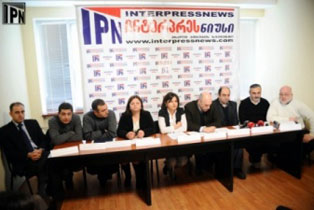Coalition For Freedom of Choice Develops Draft Amendments to the Election Code of Georgia

Coalition For Freedom of Choice
The Coalition For Freedom of Choice proposes the draft amendments to the Code of Elections – five initiatives which aim to develop the election environment in Georgia – to Georgian Parliament as a legislative proposal.
Coalition hopes the initiative will raise interest among the ruling and opposition political parties and will be reflected in the Election Code. We also hope the NGOs working on the Election Code will support our initiative.
The package of initiatives envisages amendments which ensure effective mechanisms to avoid falsification of elections.
The initiative also concerns the transparent work of election administrations. The proposals will promote the transparency of Precinct, District and Central Election Commissions and provide maximum information to public about their work.
Specifically, Coalition initiative envisages the following proposals:
1. Terms for voting on the Election Day
Time of voting process on the day of elections will proceed from 8 am to 6 pm.
Different countries envisage different times for voting (balloting). Back in the Soviet era the voting lasted from 8 am to 8 pm and it still works in Georgia. Thus the election process (ballot preparation, voting and counting results) lasted 16-18 hours. As for the counting process, the observers and election administration members were extremely tired by that time which raised the likelihood of making mistakes. Besides, the preliminary results were announced too late which intensified political tension.
The aim of the draft amendments is to change the time of voting process from 8 pm to 6 pm to provide easier environment for election administration and observers to count the results. This will decrease the number of violations during the process of voting and drawing up the documents and will timely inform public regarding the preliminary results of elections.
2. Ensuring transparent work of District Election Commissions (DECs) and Central Election Commission (CEC)
The essence of the draft amendments is to directly transmit the sessions of CECs and sessions of DECs through internet from the day of setting election till the day of publishing results.
Despite the provision of Georgian legislation according to which the sessions of election commissions are public and any interested individual can attend them; in reality it is rather hard to apply this right. One reason can be that the possibility to physically contain all interested persons in the buildings of CECs and DECs is restricted.
The draft amendment ensures right of citizens to receive full information regarding the work of election administration.
3. Estimation Number of Voters Arrived before Precinct Is Opened on the Election Day
The draft-law aims to document the number of voters before the ballot boxes are opened in the precincts, or before the ballot results are estimated and the information will be provided to the electoral contestant and representatives of the observation organizations.
The purpose of the amendment is to prevent artificial increase of vote number in order to increase the number of people who voted and consequently to assist the political parties to overcome the election barrier.
4. Ballot Papers Scanned after Ballot Box Is Opened
After the ballot boxes are opened and envelopes are counted, the ballot papers will be scanned in the precincts. The file of the scanned ballot papers will be saved separately in the computer of the precinct election commission and its copies will be disseminated among all electoral contestants and representatives of the observation organization. After all these procedures, the votes will be counted.
The previous practice of elections in Georgia showed that most violations are observed during vote counting. According to the OSCE report on the snap presidential elections on January 5, 2008, votes were badly or extremely badly counted in more than 20% of precincts. The draft-law is designed to eradicate the facts of counting frauds in the polling stations.
The draft-law aims to introduce the amendments to the Election Code which will require to document the choice of the voters before the votes are counted and its copy will be assigned to the observers and commission members representing various political parties; thus the procedure of vote counting will be impossible to fraud in the precincts.
5. Summing Up Election Results by the District Election Commission
The draft-law clearly regulates the rules how to document the protocols and other documents received from the precinct election commissions in the DEC, as well as preliminary summarize of the election results in the DEC. The draft-law also regulates participation of representatives of political parties/election block/initiative groups, monitoring and media organizations in the procedures.
In accordance to the new edition of the Georgian Organic Law “Election Code of Georgia” the functions of the DEC are significantly increased when counting the votes. However, Article 75 of the Code – Summing Up Ballot and Election Results in the DEC (and neither other articles) does not envisage the norms which can ensure the transparency of the DEC activities on the Election Day.
The draft-law aims to ensure transparent process of delivering protocols from the precincts to the DEC, transparent process of summing up of results and preparation of the election documents by the DEC, as well as creation legislative guarantees for the participation of the representatives of the political parties/election blocks/initiative groups and observers. Besides that, the number of voters arrived at the precinct before the votes are counted in the precincts, to document these data and send it to political party/election block/initiative group representatives and observers in order to prevent artificial increase of voters’ number participating in the ballot as well as to increase the votes obtained by each political party in order to overcome the election barrier.



